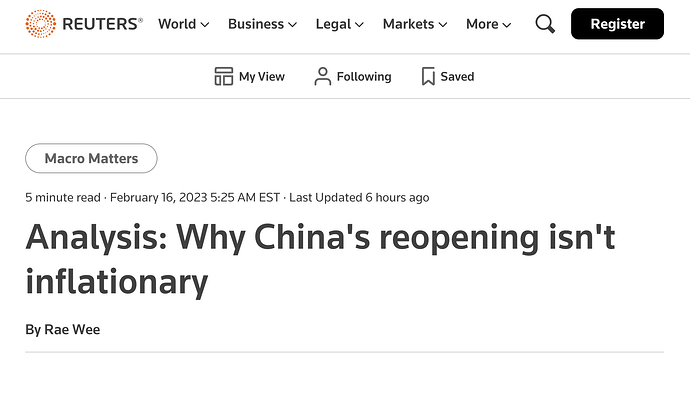-
中国在三年后开放商业,导致需求增加,并引起对全球通货膨胀的担忧。全球央行表示,需要加快加息以控制物价上涨,这引起了人们对中国被压抑的需求将导致另一波通货膨胀的担忧。大宗商品和奢侈品的价格已经上涨,因为预期会有一波消费。
-
经济学家并不认为中国的复苏是全球通货膨胀的原因,他们指出中国国家主席关于自给自足和更广泛的繁荣的蓝图,以及劳动力市场的松弛和北京的增长重点是对支出的制约。
-
法国巴黎资产管理公司亚太区高级市场策略师Chi Lo认为,中国的复苏不太可能对全球产生重大影响,因为它可能是内向型的,不会大幅提升人民币,从而导致出口价格或其他地方的价格上升。
-
中国的需求使许多人担心美国联邦储备委员会和其他中央银行将不得不进一步提高利率。
-
然而,Chi Lo认为这些担心是 “被夸大了”。
-
法国巴黎银行的投资组合经理的定位是,中国的反弹将促进地区旅游业,但不一定是制成品的出口。
-
Chi Lo认为,中国经济开始出现复苏的迹象,该国对商品的需求可能会保持稳定。
-
这种稳定性将有助于控制通货膨胀,这反过来将有助于防止出现任何大幅加息的需要。
-
Chi Lo认为,中国经济足够强大,能够处理任何潜在的需求变化,而且该国的增长可能在可预见的未来保持稳定。
-
这将有助于确保美国和其他央行不会被迫进一步加息,这可能会对全球经济增长产生负面影响。
-
中国是价格制定者的商品市场,如铁矿石和石油,不太可能因为重新开放而出现价格大幅上涨。
-
金属市场已经对一些新的需求进行了定价,铜突破了每吨9,000美元的水平。
-
基础设施支出不会是未来十年的优先事项,只为大宗商品提供微弱的尾巴风。
-
中国受益于廉价的俄罗斯石油进口,并进行了储备,抑制了作为通货膨胀来源的石油需求。
-
经济增长下滑至近半个世纪以来最糟糕的水平之一,为3.0%。
-
瑞银集团估计,中国今年全年的GDP有可能达到5%左右,但通胀率将 "仅温和地 "加速。
-
摩根大通的分析师认为通胀将开始缩减。
-
中国疲软的劳动力市场将抑制通货膨胀,因为北京的 "共同富裕 "政策导致银行家的工资和福利降低,青年失业率达到历史最高水平。市场上有很多剩余产能,所以没有劳动力短缺的迹象。
-
然而,分析师警告说,如果消费者将他们17.8万亿元人民币的储蓄用于旅游和购物,可能会出现通货膨胀。自2019年以来,机票价格上涨了一倍多,但由于抑制措施、有限的航班容量和高票价,大量中国游客前往西方机场还需要一些时间。
-
获得签证和更新护照对中国游客来说也可能是一个挑战,进一步推迟了潜在的旅行高峰。
-
多年来组织供应链的工作有助于减少价格压力。
-
猪肉产量在2022年达到八年来的最高水平,价格在1月份下降了10.8%。
-
工厂门的价格正在下降,这可能导致稳定的增长,而没有通货膨胀。
-
西太平洋银行高级经济学家Elliot Clarke认为,中国的重新开放将对世界产生积极影响。
-
它可能带来一些关键的新商品和服务的通货紧缩。
-
这可能对全球经济有利,因为它可能导致没有通货膨胀的稳定增长。
-
China has opened for business after three years, leading to an increase in demand and concerns of global inflation. Global central banks are saying that faster rate hikes are needed to control rising prices, which has caused worries that pent-up demand from China will cause another wave of inflation. Prices of commodities and luxury items have risen in anticipation of a flurry of spending.
-
Economists do not see China’s recovery as a cause of global inflation, pointing to the Chinese President’s blueprint for self-sufficiency and broader prosperity, as well as the slack in the labour markets and Beijing’s growth priorities as checks on spending.
-
Chi Lo, senior market strategist for Asia Pacific at BNP Paribas Asset Management, believes that China’s recovery is unlikely to have a significant global impact, as it is likely to be inwardly focused and not substantially lift the yuan, which would lead to an increase in export prices or prices elsewhere.
-
Chinese demand has caused many to worry that the U.S. Federal Reserve and other central banks will have to raise rates further.
-
However, Lo from BNP believes these fears are “overblown”.
-
BNP’s portfolio managers are positioning for China’s rebound to boost regional tourism, but not necessarily the export of manufactured goods.
-
Lo believes that the Chinese economy is beginning to show signs of recovery and that the country’s demand for goods is likely to remain stable.
-
This stability will help to keep inflation in check, which in turn will help to prevent the need for any drastic rate hikes.
-
Lo believes that the Chinese economy is strong enough to handle any potential changes in demand and that the country’s growth is likely to remain steady for the foreseeable future.
-
This will help to ensure that the U.S. and other central banks will not be forced to raise rates further, which could have a negative impact on global economic growth.
-
Commodity markets where China is a price-setter, such as iron ore and oil, are unlikely to experience sharp price gains due to reopening.
-
Metals markets have already priced in some new demand, with copper breaching a $9,000 per tonne level.
-
Infrastructure spending will not be a priority in the next decade, providing only a marginal tailwind for commodities.
-
China has benefited from cheap Russian oil imports and has stockpiled, curbing oil demand as a source of inflation.
-
Economic growth slumped to one of its worst levels in nearly half a century, at 3.0%.
-
UBS estimates China’s full-year GDP could potentially reach around 5% this year, but inflation will accelerate “only modestly”.
-
J.P. Morgan analysts think inflation will start to pare back.
-
China’s weak labor market will restrain inflation, as Beijing’s “common prosperity” policy has led to lower wages and perks for bankers and youth unemployment reaching a record high. There is a lot of spare capacity in the market, so there is no sign of a labor shortage.
-
However, analysts are cautioning that inflation could emerge if consumers use their 17.8 trillion yuan savings to travel and shop. Airfares have more than doubled since 2019, but it will take some time before large numbers of Chinese tourists are travelling to Western airports due to curbs, limited flight capacity, and high fares.
-
Obtaining visas and renewing passports could also be a challenge for Chinese tourists, further delaying the potential surge in travel.
-
Years of organizing supply chains are helping to reduce price pressures.
-
Pork production reached an eight-year high in 2022 and prices decreased 10.8% in January.
-
Factory-gate prices are going down, which could lead to steady growth without inflation.
-
Westpac senior economist Elliot Clarke believes China’s reopening is going to be positive for the world.
-
It could bring deflation in some key new goods and services.
-
This could be beneficial for the global economy, as it could lead to steady growth without inflation.
链接:Analysis: Why China's reopening isn't inflationary | Reuters
